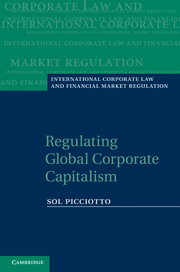Book contents
- Frontmatter
- Contents
- Preface
- Acknowledgements
- Table of cases
- Abbreviations and acronyms
- 1 Transformations of global governance
- 2 Liberal internationalism: strengths and limits
- 3 From interdependence to fragmentation
- 4 Corporations and competition
- 5 Corporate rights and responsibilities
- 6 International taxation
- 7 Regulation of international finance
- 8 The WTO as a node of global governance
- 9 Intellectual property rights
- 10 Law and legitimacy in networked governance
- Bibliography
- Index
3 - From interdependence to fragmentation
Published online by Cambridge University Press: 05 June 2012
- Frontmatter
- Contents
- Preface
- Acknowledgements
- Table of cases
- Abbreviations and acronyms
- 1 Transformations of global governance
- 2 Liberal internationalism: strengths and limits
- 3 From interdependence to fragmentation
- 4 Corporations and competition
- 5 Corporate rights and responsibilities
- 6 International taxation
- 7 Regulation of international finance
- 8 The WTO as a node of global governance
- 9 Intellectual property rights
- 10 Law and legitimacy in networked governance
- Bibliography
- Index
Summary
The previous chapter has discussed the tensions within classical liberal internationalism, and some of the attempts that have been made to resolve them while maintaining its basic features. I have argued in Chapter 1 that the strains of these tensions have resulted in a fragmentation of the state, and the emergence of new forms of networked governance. This chapter will examine some of the dynamics of the transformation of statehood, including an overview of the various ideologies which have helped to drive and tried to rationalize this process.
The firm, the state and regulation
By a strange paradox, in the closing period of the twentieth century the world economy was generally considered as dominated by unrestrained and anarchic ‘market forces’, although in fact social and economic activities have generally become more explicitly and formally governed. A clear understanding of the changes taking place has been greatly hampered by both the aggressive promotion of a fundamentalist version of liberalism proclaiming the virtues of ‘the market’, and the often ill-judged reactions to this neo-liberalism by its opponents. This was remarkable, since liberalism's central assumption that social and economic relations consist of transactions between autonomous individuals, seems very hard to reconcile with the highly corporatized and regulated social and economic structures that were everywhere evident. Furthermore, much of the political debate in this period centred on the false dichotomy between the ‘free’ market and state intervention.
- Type
- Chapter
- Information
- Regulating Global Corporate Capitalism , pp. 61 - 107Publisher: Cambridge University PressPrint publication year: 2011



